A horse may just be a horse, but in Troy, it’s a lot more spectacular when paired with the likes of Orando Bloom, Brad Pitt, and Eric Bana. This epically expensive tale of passion, pride – and, of course, that face – might be one of the greatest stories ever sold. An exclusive from the Cabo San Lucas set of Troy.
It isn’t pretty, what they’re doing to Orlando Bloom. He’s flung himself onto the hard-packed Mexican dirt several times now, enacting the turning point of a complex scene in which his character, Paris, has just taken a (terrible) battering from Brendan Gleeson’s Menelaus.
“For me,” says Bloom, “this scene is the most intimidating part of this whole shoot, because I knew that I was going to have to run from this moment—I just hobble and crawl away to my brother’s feet. It’s just humiliation, the lowest possible point for a character to get to.”
The shot that director Wolfgang Petersen is going for at the moment comes just after Hector has dispatched Menelaus, and is beseeching his younger brother to flee inside the gates even as the Greek legions come on the run. But in a rash choice, the bloodied Paris sprints for the stubby bronze sword of Troy that Menelaus had knocked from his grasp. The shot will show one man running toward the angry horde. “Just when you think he’s gone mad,” Petersen will later explain, “he’s turned it into the quite heroic act of getting the sword of Troy.”
But Petersen isn’t quite seeing what he wants in Bloom’s gritty ten-yard sprint and culminating dive to earth, and he calls for a cut in an assiduously patient tone.
As the scene is reset, Bloom stands inquisitively near Bana, with whom he’s become good pals. “You look like you’ve got a basketball between your legs,” is Bana’s tough-love assessment of the younger man’s dash, “or maybe a melon.”
“My legs are a bit bow,” says Bloom resignedly, then he addresses Petersen more loudly, but neutrally, “Are we doin’ this again?”
Petersen gives him a wry nod. Bloom squints a bit to show that his next question is only 25 percent or so humorous: “So, just…act…better?”
“What can I say?” answers Petersen, who even in his floppy white sun hat carries some of the elegance of a master of ceremonies in a Weimar nightclub. “Just do it different.” Finally he gives in to the concept, “Better.”
Petersen, a veteran German theater director, first made his mark on world cinema with Das Boot in 1981, and that model of undersea cinematic claustrophobia wouldn’t seem a natural calling card for this sprawling epic that he estimates to be “90 percent outdoors,” with early scenes filmed in Malta and much of the Greek assault from beach to city shot here in Cabo, on a 2,800-acre spread that boasts two miles of mostly untouched coastline. After the sub movie, it took nearly a decade for the director to find real traction with In the Line of Fire, followed by the middling Outbreak. But 1997’s Air Force One earned more than twice its $85 million budget, and The Perfect Storm was a global hit. Sheltered momentarily from the sun by a blue tarp, Petersen, 63, considers what he’s taken on: “I’ve done big complicated movies, but nothing of this score. It’s so complex. This is, so to speak, the big one for me in the sense of the difficult logistics of it and everything. It’s very challenging.”
The slate a crewman is marking up with black ink notes that the scene in question is 94C. The prelude has been Hector intercepting Menelaus (“I’ll kill him at your feet. I don’t care,” growls the cuckolded king) and plunging his sword in until its hilt meets the king’s breastplate. (Some of the film’s spear and sword strikes are done with telescoping blades and spear points; others will be mimed thrusts with the nasty parts filled in via computer graphics.) Then, as Benioff’s script describes it, Agamemnon (Menelaus’s brother…played by Brian Cox) shouts a wordless cry of rage and “the entire Greek army surges forward . . . fifty thousand soldiers charge at Hector. . . ”
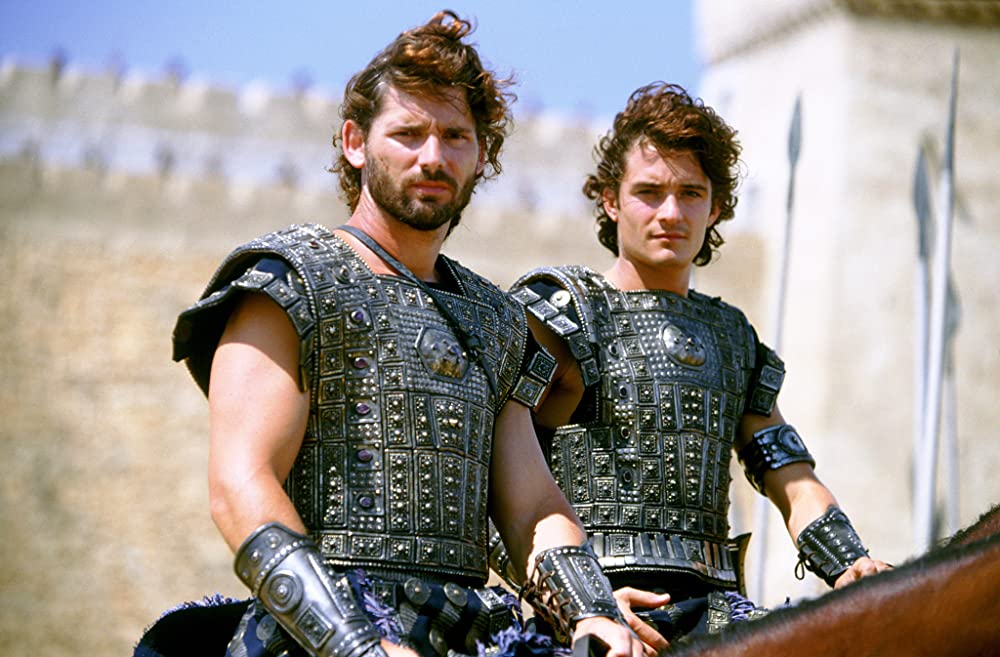
What Petersen has, before the magic of computer-generated regiments, is one one-hundredth of that number. He watches his first assistant director, positioning the 500 extras for the charge up the hill. They are outfitted variously as Myceneans, Spartans, Thessalonians, Ithacans, Salaminians (led by Ajax), and, most fearsome, the black-clad Myrmidons (who are led by Achilles, albeit not in today’s scene). The spear-carrying knot of 500 is there to form the nucleus of a horde that will be multiplied by computer renderings in the final picture. Standing nearby, visual-effects supervisor Nick Davis, is keenly interested in Petersen’s camera placement. “You have to look at each camera and say, ‘No, that won’t work,’ or ‘Yes, we can do that.’ We’ve got one superlong lens which will really stack [Bloom and Bana] up against the extras. It will look great. And then the other shot, it’s ideal to get a wider lens further and further away. There’s a lot of storytelling, a lot of beats that need to happen between when that lot [he gestures toward the extras shambling into place] charge and when they meet the Trojans here. And of course in reality it’s not going to take them that long to get here. There’s a finite stretch you can do before people say, ‘Nuh-uh, they’ve been running forever.’ ”
Davis, Petersen, and director of photography Roger Pratt discussed all this first thing in the morning, as they always do. What Petersen’s chiefly hoping is that the long lens sitting well behind Bloom and Bana, the one that will “stack” them against the onrushing army to create a sense of urgency in the compressed space that results, will lie for him: “It’s very tricky because on a shot like this, these are fifty thousand, after CG. They’re advancing toward the twenty thousand Trojans that are on this side. It’s more dramatic if there is not an endless gap between these two armies.
“But what would it take in real time for an army to come from there to here? Something like fifteen to twenty seconds? The scene will definitely be a minute. So you cheat a little bit and stretch it and hopefully you find the right amount of cuts so you can make it believable. It’s just finding out in the editing room later on how much you can stretch it and where you really have to say, ‘Okay, now they have to clash.’ ”
With a gesture to Gavigan, Petersen indicates that he wants to see the rush of the meant-to-be-terrifying army. They’re huddled downslope on the dusty field, mostly in comfortably breezy skirtlike getups that unfortunately are topped by all manner of rubber and plastic armor. Put a man in a long, itchy wig and a large, tight rubber helmet out in a field to kill time for 40 minutes under the midday sun, and the production aides coming around with backpack rigs full of water aren’t much consolation. Thick with local hires as well as a sub-army of more than 200 Bulgarian jocks, the group is not quite surly but is certainly far from ecstatic over being lined up to rehearse their uphill sprint. They watch as the camera crew scrambles aboard a dolly rig that is to be impelled alongside the charge—but they know that the money part of this shot, Cox’s Agamemnon surging alongside in a chariot, will be filmed later. An assistant director palavers to them in a tone that’s at once wheedling and threatening, then hollers up the hill toward Gavigan: “What’s the cue, Gerry?”
Gavigan, trained to respond quickly, barks out a not entirely commanding, “Ummmm . . . ” A pause. “Charge! How about that?”
“Okay, here we go, boys,” hollers the AD. As the camera cart rolls, he gives the order, and the 500 extras proceed to charge at baby turtle speed, with anemic, not to say sardonic, battle cries. “Cut, cut, cut, cut, cut,” comes the instruction, and then, a bit wearily, “Let’s go again.”
Petersen is unfazed. “It’s an extremely difficult movie, as I said. Such an outdoor movie. You know how vulnerable you are as a production. A lot of people get sick—a big problem we still have. With these logistics and the sickness and the heat—I think what keeps us going is that we have a really good movie. If there were any doubt about what we are doing here, it would be almost impossible to go through this. It’s Homer, it’s The Iliad. A wonderful combination of grand scale and intimate human relations, a mutilayered story.” Preparing to head into the broiling sun and survey both the troops and the shot, he gives a poker player’s twist of the mouth, as if reminding himself of something that has served as daily inspiration: “One of the great stories of all time.”
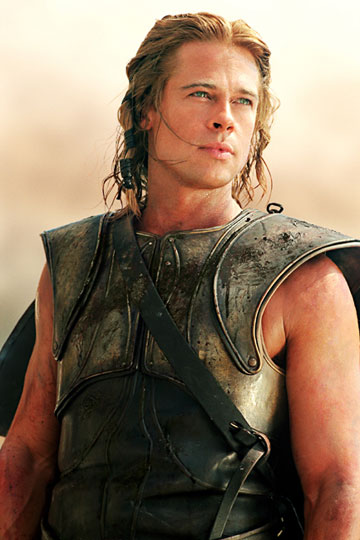
“I guess the best evidence of the power of the Trojan War myth,” says David Benioff, “is that we’re still talking about it three thousand years later.” Now one of the hotter screenwriters in Hollywood, he was still mostly a novelist looking to stray (although he had adapted his own book The 25th Hour for Tobey Maguire’s production shingle) when he walked into Warner Bros. executive Jeff Robinov’s office in October 2001. It was the first such pitch meeting in his career. “I was terrified, and not particularly articulate, I don’t think, and Jeff was kind of staring at me. I was trying to make it sound eloquent, but it really felt like I was blowing it,” he says. “I felt like, oh my…, I’ve taken this great story and somehow made it seem unappealing. Because he’s got a great poker face. He doesn’t give away anything.” Robinov asked Benioff to wait for a moment and departed—to check, it would later emerge, with his then boss Lorenzo di Bonaventura. “At the very end of the meeting, he said, ‘Are you ready to start writing?’ And that was kind of a shock.”
Benioff’s story encompasses much more than Homer’s tale of the war; it also used Virgil’s Aeneid and various histories. “The Iliad begins with the rage of Achilles over Agamemnon’s abduction of a slave girl, Briseis. In my script that doesn’t occur until page 82 or so. This is the Trojan War myth in its entirety, and I’ve taken serious liberties, and been ruthless in terms of what to cut out and what to change.”
The screenplay he came up with was so clean that Warner Bros. took the extremely rare step of sending it right out to Petersen, whose Radiant Productions has a deal with the studio, and around the same time slipped a copy to Pitt.
Pitt had all but signed on when he met up with Petersen: “We had a nice dinner in a German restaurant in L.A. called Black Forest, having a good time with very heavy German food and some beers,” the director recalls. “We talked about the script and the part and got very excited about it. We talked also about Eric Bana, who I had met in the meantime and we both had the feeling that he could be a great Hector. And then came the long hard work of casting the other parts.”
Bana, a formidable presence at 34 (when he was cast), needed a younger brother who shared at least some of his chiseled features but could be the sheltered neophyte to his veteran soldier—and the impetuous lover to the most dangerously beautiful woman in the world. Bloom, then 25, had burst onto the scene just months before as the earnestly heroic Legolas in The Lord of the Rings: The Fellowship of the Ring. He’d also had a small part in Black Hawk Down, but otherwise he was untested. In a meeting at London’s Dorchester hotel with Petersen and producer Diana Rathbun, he was, Rathbun recalls, “most articulate; he really understood the torment of Paris, you could see it in his face as he spoke, see it take hold.”
Recent history has of course shown their wisdom. During the weeks when Bloom was on theater screens alongside Johnny Depp in the blockbuster Pirates of the Caribbean, most Internet film and fan sites were getting as many hits for him as they were for Depp. His stardom by now seems assured, and, to most observers, likely to last; after Troy, he has no fewer than four projects in various stages of production, including the leading role in the Crusades drama Kingdom of Heaven for his Black Hawk Down director, Ridley Scott.
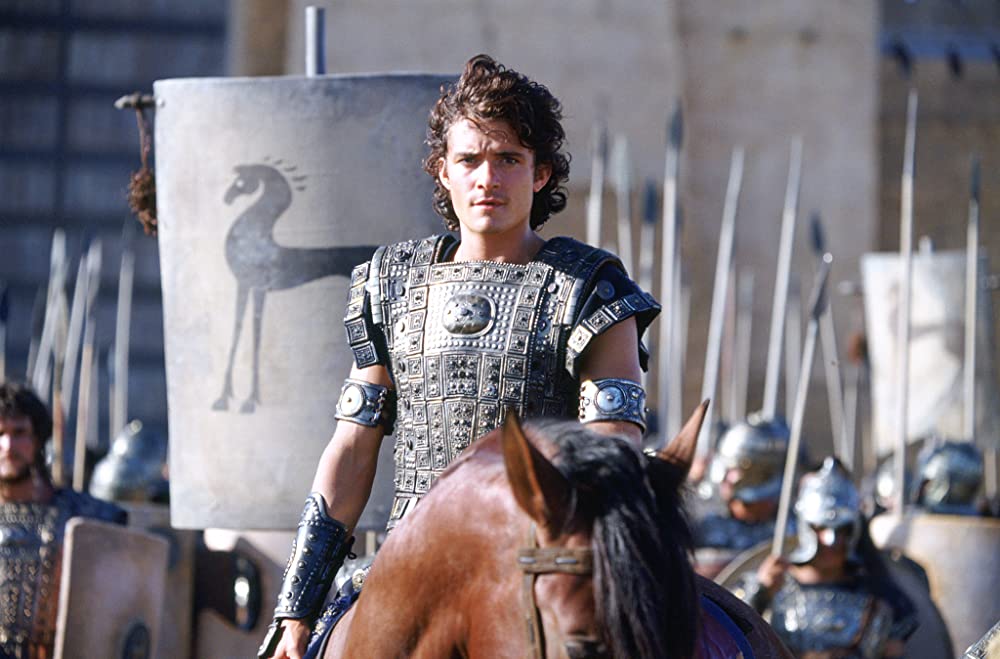
Before long, Petersen had rounded out his cast with Bloom’s LOTR compatriot Sean Bean as Odysseus, 19-year-old discovery Garrett Hedlund as Achilles’s impetuous younger cousin Patroclus and the venerated Peter O’Toole and Julie Christie as King Priam of Troy and Achilles’s mother, Thetis. Then came the search that would allow the director to brag, quite accurately, “We have so many beautiful women here.” The willowy Saffron Burrows was cast as Hector’s wife, Andromache, and Australian ingenue Rose Byrne, after being discussed for the Helen role, was signed to play the slave girl Briseis. “Only Briseis calms Achilles down and pulls him back to earth,” says Petersen, and Byrne agrees: “He lets his guard down a bit around her—not a lot, but it shows his humane, vulnerable side.”
Finally, the epic needed the woman who intoxicates young prince Paris and thereby spurs all that follows. “All the blood, all the violence of the war was initiated by a passionate love story,” says Petersen. Helen of Troy had to be otherworldly, a blond aberration among the swarthy Greeks; with her lambent blue-green eyes and aristocratic bearing, German model-turned-actress Diane Kruger won the day.
In keeping with Petersen’s wish for “fresh faces,” it was not, other than Pitt, the costliest cast. But as Warner Bros. prepped the budget with Rathbun, they watched the cost inevitably rise. The drumbeats leading to the U.S. invasion of Iraq were unmistakable, and with so much uncertainty and possible turmoil, Morocco was scrapped as a location for the months of work by a beach. Massive props were broken down and crated for the move to Cabo San Lucas in the bellies of Russian Antonov transport planes. One of these was the 40-foot-high Trojan horse, with which the Greeks manage to penetrate the city’s defenses. It had played its part well in Malta, as Bean recalls: “I was expecting a trap door, but we actually came through doors in the horse’s neck, side, and flanks. It looked like it was all covered in insects.”
For the cast and crew who were simply moving from one scorchingly hot coastline to another, the decampment to Mexico was hardly a holiday—even though Cabo has become a noted vacation destination. There was also the hard-to-assess PR debacle of widely circulated paparazzo photos of Pitt, helmetless and casual, gams attractively bare, talking on a cell phone in the Maltese sun.
There’s no escaping that much of the weight of properly bringing off this staggeringly expensive epic rests on Pitt’s portrayal of Achilles, whom Petersen calls “a haunted guy, not necessarily really happy.” Petersen grants the skeptics their question—“I would say normally, ‘Is that Brad, can he pull that off? Does he have that kind of dark side to him?’ ” But, he adds, “He absolutely has. I think Brad had from the very beginning a very strong instinct about how to play this part. He felt as an actor that he was born to do this. At some point he even said to Peter O’Toole, ‘All the parts I [ever] did were like a preparation for this part.’ His whole demeanor every single day here—his physical preparation, his mental preparation, the fact that he stopped smoking for it—he did everything to get ready for the part and into the part.”
On Super Bowl Sunday, Pitt leveled a sword at a huge worldwide TV audience in a Troy trailer and promised an unseen Agamemnon, “Before my time is done, I will look down on your corpse and smile.” Petersen, who watched a cast of mainly British actors easily spout the lines in the production’s haute-English style (what’s called Received Pronunciation), admits that for Pitt, “there was maybe some struggle from the very beginning, finding the right dialect. But he got control of that very quickly and from that, following the mission of being the greatest warrior of all time.”
As Petersen worked through key sequences in the movie, important Achilles scenes were stacked toward the shoot’s last days—including a postcoital moment with Briseis, an epochal battle with Hector, and a poignant encounter with Priam, who pleads for a slain warrior’s body. The battle in fact had to await a major set rebuilding after a hurricane hit Cabo, as well as downtime after Pitt, in a costly coincidence, hurt his Achilles tendon.
Pitt wasn’t alone in being challenged. Bana brooded at length before accepting the Hector role. “It’s the process of convincing yourself that you’re up to it,” he says, “because if you can’t do it you’re going to make a monumental c*k of yourself.”
Since shooting started, Bana has had no regrets. He came to regard screen brother Bloom “as like a real brother,” and was delighted to work opposite the legendary O’Toole. “To perform scenes with someone you feel genuine affection for . . . because Orlando’s playing my brother, Peter’s playing my father, and I’ve had some stuff with Peter inside the scene as we were playing—just really special,” he says. “We had an amazing scene this week, just before I go off to battle Achilles—bidding farewell to my immediate family. Peter’s character is about the only one I allow Hector to show any emotion toward, so it was just really nice, a total no-acting-required moment.”
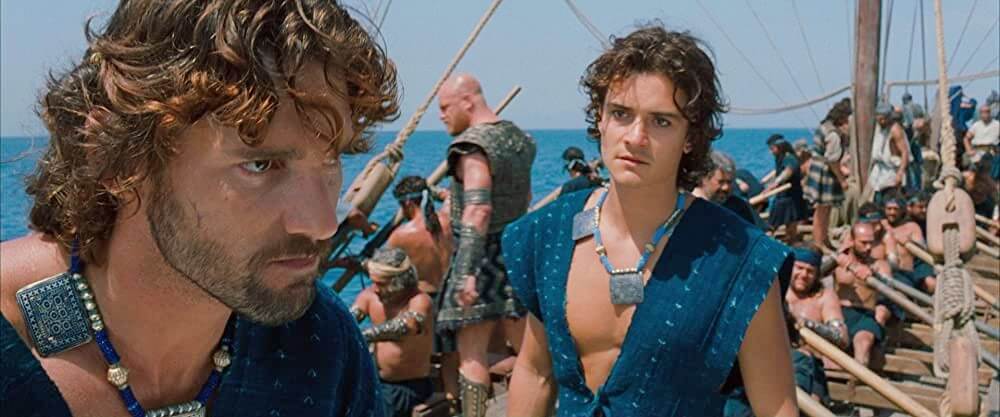
From the moment when Bloom and Bana first met—a practice horseback ride in London, with plenty of excited speculation about the film (“Two boys on their horses, talking about the adventure to come,” recalls Bloom), and cigars and more talk after—the bonding has been unequivocal. “I look up to him, a real honorable man,” Bloom says of his costar. “Like Hector is to Paris, he’s a real rock.”
As Bloom sits talking, studiously ignoring the long gash the makeup crew has created on his right thigh, he’s mindful that “I still have to shoot this scene where I see my brother go out to fight Achilles. Hector is an honorable and skillful and brave and strong fighter, you know. But Achilles is just a killer. So when he goes out to fight—I still have to play this moment where I see my brother do what I should have done.”
“Paris is a very different role for Orlando Bloom,” says Benioff. “Obviously he was the kind of fearless hero in The Lord of the Rings who gets to run up an elephant and shoot an arrow in his brain. And here, yeah, he is showing fear. I would just say in defense of Paris, I mean, I don’t think many of us have had to walk across a field facing a large angry man with a sharp sword who wants us dead because we stole his wife.”
“Amidst this epic, fantastic, huge sort of drama,” says Bloom, “it’s very human at the crux of it. It deals with very human issues: anger, hate, love, fear, and all those things that lead a man to war, lead a country to war.
“As a young prince, Paris has been protected by the umbrella of that family and that environment,” he adds. “He’s an archer, which is more of a sport, and he’s never really taken up a blade. He’s left it up to his older brother to be the warrior. He’s a complex character, an antihero, dark. There are certainly a lot of dark qualities about him because of the decision he makes.”
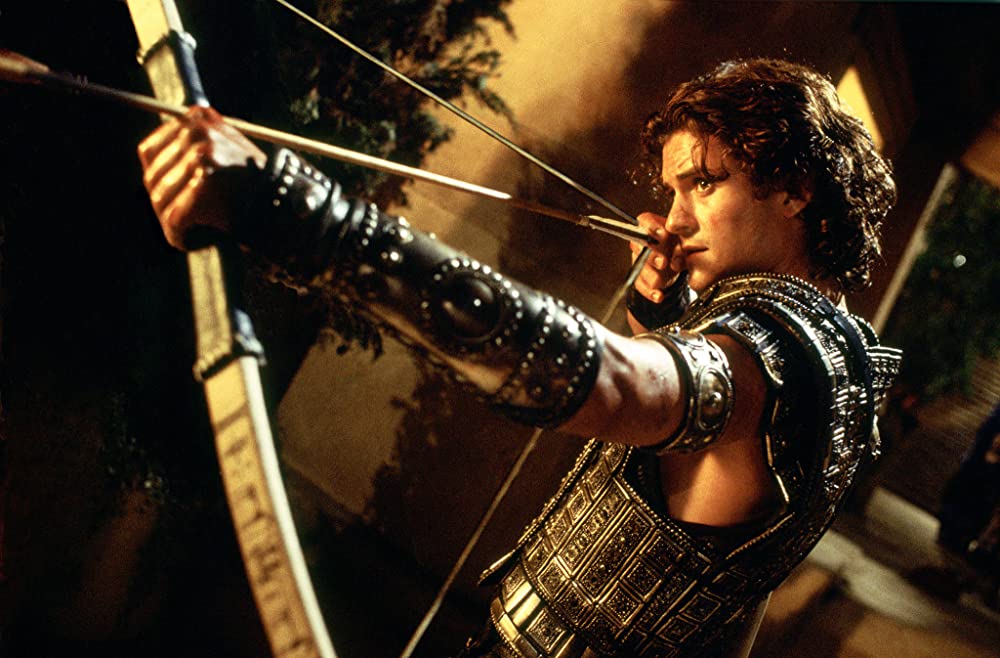
Despite his treatment at the hands of Menelaus, Paris will live to fight on for Troy. In fact, those archery skills will, as readers versed in Homer’s story well know, lead to a crucial enemy’s death in a way that’s anything but gentle. Just as Brian Cox’s Agamemnon was induced to slaughter a hugely sympathetic character in the person of a man he much admires—“It was nerve-wracking,” he says. “On my first day I killed one of my icons”—Bloom must unleash his arrows at Pitt’s Achilles. “He’s a demigod, the most incredible warrior known to man, and the fact that I have to [do that] was such a challenge—to try and make an audience understand the motives behind this character’s actions so they don’t completely despise him. ”
Bloom pauses as a seabreeze that’s accompanying the arrival of dusk sends a half-hearted dust devil across the ground toward him. Just behind it is an assistant director coming to say Bloom is wrapped for the day. Many a young actor would be halfway to the trailer in a heartbeat, heading for the hotel pool and a beer, but Bloom politely asks for a moment and walks a few paces to get his benediction from Petersen. He gives an inquiring look, ready for a last thought, but the director just gazes back with obvious fondness and gives him an acknowledging nod. Well, then, Bloom’s manner seems to say, as he brings forth his hand with a slightly formal hitching motion to shake Petersen’s. “A pleasure doin’ business with ya, boss,” he says. Trudging through the giant plaster construction that is the city gate, he finishes his interrupted thought: “Paris is a young man, and I’m a young man. And as a young man, you’re coming to terms with an awful lot that you battle with. It’s the seven deadly sins, you know, everyone’s trying to understand what they mean to him. And so it’s been a challenge.” He waits a beat, making sure of eye contact so it’s understood that if the next words are the expected ones, they’re not empty: “But a really exciting one.”
*Side quote* – “My biggest challenge,” says Bloom, “was to step into the shoes of a character who is fundamentally doing something so wrong.”